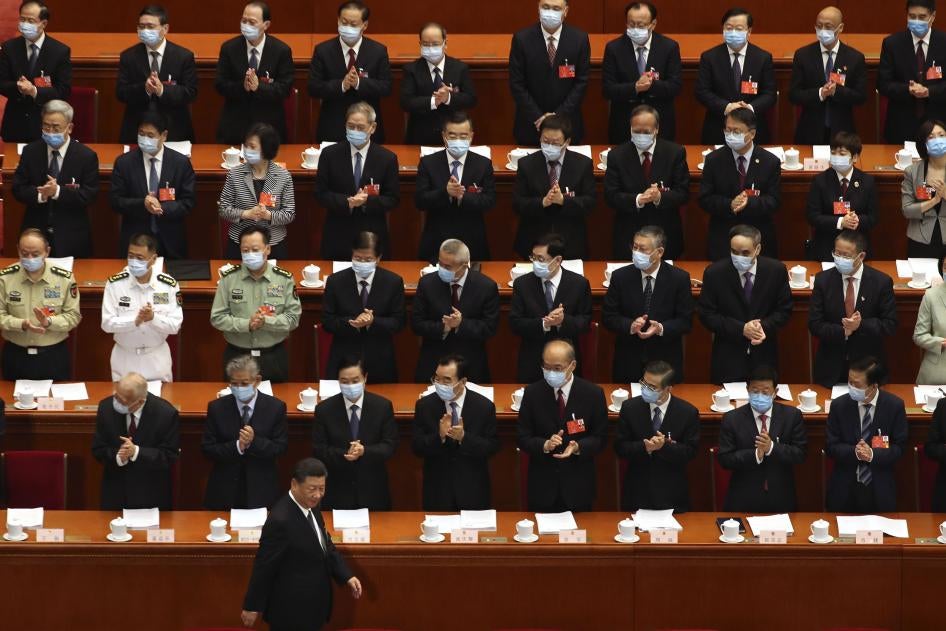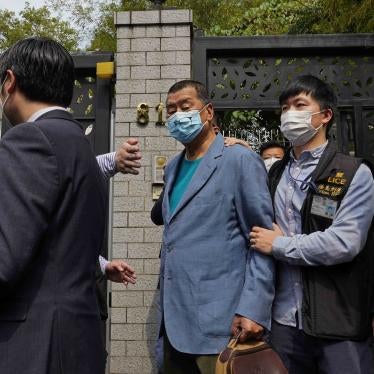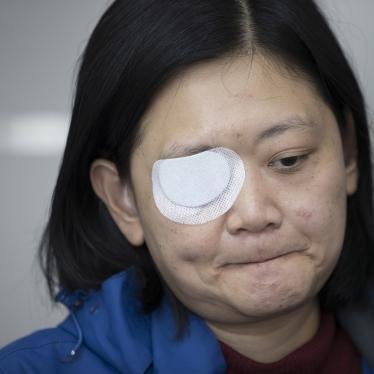(New York) – The Chinese legislature’s adoption of a formal decision to directly impose national security legislation on Hong Kong threatens the basic rights and freedoms of the city’s people, Human Rights Watch said today. The law, which China’s National People’s Congress (NPC) almost certainly will enact, will prohibit acts of “splittism, subversion, foreign intervention, and terrorism,” vague terms that the Chinese government has frequently used on the mainland to punish peaceful dissent.
“The new national security law will deal the most severe blow to the rights of people in Hong Kong since the territory’s transfer to China in 1997,” said Sophie Richardson, China director at Human Rights Watch. “Hong Kong people will now have to consider arrests and harsh sentences for protesting, speaking out, running for office, and other freedoms they have long enjoyed and struggled peacefully to defend.”
The NPC’s decision authorizes the body’s Standing Committee to draft the legislation, following which the committee will add it into Annex III of Hong Kong’s Basic Law, the city’s functional constitution. The Hong Kong government will then promulgate the law and make it effective in Hong Kong.
The decision to directly insert the national security legislation into Annex III of the Basic Law raises serious concerns about human rights protections. Hong Kong’s “one country, two systems” constitutional arrangement means that China’s national laws do not apply to the city. While article 18 of the Basic Law gives the NPC’s Standing Committee powers to add laws to Annex III, the laws must undergo either legislation or promulgation.
Legislation would involve the Hong Kong government introducing a bill to the Legislative Council (LegCo, Hong Kong’s semi-democratic legislature) for debate, amendments, and voting. This would allow the council to review the legislation, including evaluating whether the law complies with international human rights standards guaranteed under the Basic Law. To promulgate the law, the Hong Kong chief executive issues a legal notice in the Government Gazette, and the Chinese national laws concerned are applied verbatim. This will be the first time that a Chinese law carrying criminal penalties will be introduced to Hong Kong through promulgation and without a legislative process.
The Hong Kong government tried to introduce national security legislation in 2003, prompting massive protests and the withdrawal of the bill. The NPC, in its new decision, is explicit that its actions intend to bypass popular oversight through the Legislative Council.
The NPC decision also raises concerns because article 18 of the Basic Law states that such insertion of Chinese national legislation into Annex III “shall be confined to those relating to defense and foreign affairs as well as other matters outside the limits of the autonomy of the Region.”
Under the Basic Law and the bilateral treaty between the United Kingdom and China at the time of Hong Kong’s transfer of sovereignty, Hong Kong has a “high level of autonomy.” The Hong Kong government has autonomous powers to manage the city’s affairs, except for defense and foreign affairs. Article 23 of the Basic Law empowers the Hong Kong government to “enact laws on its own” to prohibit subversive acts. This suggests that it is the Hong Kong government, not the NPC Standing Committee, that has the power to legislate on Hong Kong’s national security.
The NPC Standing Committee will meet next in late June. As it takes three readings to legislate, the earliest the national security legislation will take effect will be around November, according to mainland media.
The NPC decision also states that the law will allow the central government to set up “relevant” institutions to protect “national security” in Hong Kong. Although there are few details, this could mean the establishment of agencies such as the Ministry of State Security and the National Security Bureau of the Ministry of Public Security – agencies long known for rights abuses in China, including arbitrary detention and torture – to operate in Hong Kong.
In addition, pro-Beijing sources say the law would enable the Hong Kong government to ban “foreign groups or organizations” designated by Beijing as being involved in “color revolutions” – another vague term that could apply to any groups critical of China’s government. It could also ban people who work for or receive funding from these organizations from entering Hong Kong.
The Chinese government conceptualizes “national security” in such a broad manner that people exercising their basic human rights and defending them peacefully, including activists, human rights lawyers, scholars, ethnic minorities, and netizens, are detained and imprisoned for years – sometimes for life – for crimes such as “subversion,” “inciting subversion,” “splittism,” and “leaking state secrets.”
Hong Kong Chief Executive Carrie Lam issued a statement stating she will “comply fully” with the NPC’s decision. The proposed legislation already faces opposition from the pro-democracy movement. Even after the law is promulgated, it could still face challenges in the courts.
While the Chinese government controls China’s judiciary, Hong Kong has its own legal system, and the courts have long been regarded as independent and highly professional. The national security legislation will put additional strain on the judiciary, which has increasingly had to rule on more politically motivated prosecutions. Any legal challenges related to the national security legislation will challenge the judges’ independence, as the legislation will raise conflicts with the Basic Law’s human rights protections.
Judicial rulings against the government on this key legislation could result in Beijing intervening in Hong Kong’s judicial process and “interpreting” the law, as it did in 2016, further damaging Hong Kong’s judicial independence.
Since mid-April, amid the Covid-19 crisis, the Chinese and Hong Kong authorities have heightened their assault on Hong Kong’s pro-democracy movement, and Beijing has escalated its efforts to impose direct control over the city’s governance.
Governments should take concrete actions to help protect the rights of people in Hong Kong, Human Rights Watch said. They should sanction senior Beijing and Hong Kong officials responsible for recent human rights abuses in Hong Kong and future abuses under the national security legislation, subjecting them to travel bans and asset freezes. They should also offer a safe haven to Hong Kong people who suffer retaliation for exercising their human rights.
“Governments have offered little beyond rhetoric in support of Hong Kong’s freedoms while Chinese authorities have accelerated violations in the mainland and Hong Kong,” Richardson said. “China’s imposition of a Hong Kong security law under the cover of Covid-19 shows the need for strong international action.”








